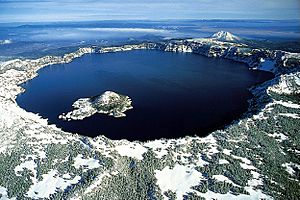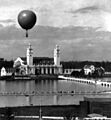List of lakes of Oregon facts for kids
Oregon is a state in the Pacific Northwest known for its amazing natural beauty. It has many different types of water bodies, including sparkling lakes and large reservoirs. Lakes are natural areas filled with water, often formed by glaciers, volcanoes, or rivers. Reservoirs are like artificial lakes, created by building a dam across a river to store water. People use these reservoirs for things like drinking water, electricity, and even flood control.
Oregon's lakes and reservoirs offer lots of fun activities. You can go swimming, fishing, or boating in many of them. But remember, some lakes are protected or have special rules, so not all activities are allowed everywhere. This article will explore some of Oregon's most interesting and important lakes and reservoirs.
Contents
Oregon's Natural Lakes
Oregon is home to many beautiful natural lakes, each with its own unique story. Some are ancient, some are high in the mountains, and some even disappear and reappear!
Crater Lake: A Deep Blue Wonder

One of Oregon's most famous lakes is Crater Lake. It's not just beautiful; it's also incredibly deep! In fact, it's the second deepest lake in the Western Hemisphere. This amazing lake formed inside the collapsed top of an ancient volcano called Mount Mazama. The water is known for its stunning deep blue color, which comes from its incredible purity. Crater Lake is a must-see for anyone visiting Oregon.
Mountain Lakes: High and Clear
High up in Oregon's mountains, you'll find many clear, cool lakes. These lakes are often fed by melting snow and ice.
- Waldo Lake is a beautiful lake in the Cascade Range. It's known for its incredibly clear water, making it a great spot for quiet reflection.
- Elk Lake is another small, scenic lake along the Cascade Lakes Scenic Byway. It offers stunning views of the surrounding mountains, like South Sister.
- Suttle Lake is located on the east side of Santiam Pass. It's a popular spot for camping and fishing, surrounded by tall trees.
- Cultus Lake is a mountain lake in the Deschutes River watershed. It's a great place for boating and enjoying nature.
- Diamond Lake is about 10 miles (16 km) north of Crater Lake. It sits between Mount Bailey and Mount Thielsen, offering fantastic views and great fishing for rainbow trout.
- Legore Lake in the Eagle Cap Wilderness is the highest true lake in Oregon. It sits at an elevation of 8,950 feet (2,730 meters)!
- Teardrop Pool is an even higher lake, located right on the summit of the South Sister volcano. At 10,400 feet (3,170 meters), it's Oregon's highest lake.
Coastal Lakes: Dunes and Water
Along Oregon's beautiful coast, you'll find several lakes that are "dammed" by sand dunes. This means the dunes act like natural walls, holding the water in.
- Siltcoos Lake is the largest lake along the Oregon coast that's held back by sand dunes. It's near Florence and is a popular spot for fishing and boating.
- Cleawox Lake is another dune-dammed lake near Florence. It's a lovely place to visit and enjoy the coastal scenery.
- Woahink Lake is the deepest of the dune-dammed lakes along the Oregon coast. It's also near Florence and is a great place for water sports.
Seasonal and Unique Lakes
Some of Oregon's lakes are quite special because they can dry up seasonally or have very unique features.
- Lake Abert is a large, shallow lake in central Lake County. It's known for its high salt content and is an important stop for migrating birds.
- Fossil Lake is a lake in northern Lake County that often dries up during certain times of the year. When it's dry, it reveals ancient fossils!
- Christmas Lake is another lake in the Christmas Valley that can be seasonally dry.
- Borax Lake in Harney County is an alkali lake. It's famous for being the home of a special type of fish called the Borax Lake chub, which can only be found there.
- Harney Lake is a natural lake that sometimes disappears! It can also merge with Malheur Lake when water levels are very high.
- Mann Lake is the largest "playa lake" in the north Alvord Valley. Playa lakes are shallow, temporary lakes that form in desert basins.
Oregon's Reservoirs: Man-Made Lakes
Reservoirs are artificial lakes created by building dams. They are very important for managing water resources in Oregon.
Large and Important Reservoirs
Many of Oregon's largest lakes are actually reservoirs, built for various purposes like flood control, irrigation, and generating electricity.
- Upper Klamath Lake is Oregon's largest lake by surface area. While it's a natural lake, its water levels are managed by dams, making it function somewhat like a reservoir. It's a vital part of the Klamath River system.
- Owyhee Reservoir is Oregon's longest lake, stretching for 52 miles (84 km) in Eastern Oregon. It was created by the Owyhee Dam on the Owyhee River and is used for irrigation.
- Lake Billy Chinook is a large reservoir formed by the Round Butte Dam. It brings together the waters of the Crooked, Deschutes, and Metolius rivers. It's a popular spot for boating and fishing.
- Detroit Lake is a big reservoir created by the Detroit Dam on the Breitenbush and Santiam rivers. It's a popular recreation area and helps control floods.
- Henry Hagg Lake is a large reservoir west of Forest Grove. It's a popular spot for fishing, boating, and even triathlons.
Reservoirs for Recreation and Wildlife
Many reservoirs are also great places for outdoor activities and support local wildlife.
- Crane Prairie Reservoir is a large reservoir in Deschutes County. It's known as one of Oregon's best places for catching rainbow trout.
- Applegate Lake is a flood-control reservoir on the Applegate River. It's a beautiful area for camping, fishing, and enjoying the outdoors.
- Lost Creek Lake is a reservoir on the Rogue River. It's a popular destination for fishing, boating, and swimming.
- Fern Ridge Reservoir is a large reservoir in Lane County. It's a great spot for sailing and birdwatching.
- Timothy Lake is a reservoir on the Oak Grove Fork Clackamas River. It offers stunning views of Mount Hood and is popular for camping and fishing.
Former Lakes
Oregon has also had some very large lakes in the past that no longer exist today.
- Lake Allison was a huge ancient lake that once filled the entire Willamette Valley to a depth of 300 to 400 feet (91 to 122 meters).
- Lake Modoc was another former lake on the Klamath River.
- Guild's Lake was a lake that used to be in Northwest Portland. It was later filled in for development, including for the 1905 Lewis and Clark Exposition.
Images for kids
-
Lake Abert and the Abert Rim
-
Applegate Lake in Jackson County
-
Cleawox Lake on the coast
-
Cullaby Lake in Clatsop County
-
Cultus Lake in Deschutes County
-
Elk Lake and South Sister
-
Fern Ridge Reservoir on the Long Tom River in Lane County
-
Fish Lake with Mount McLoughlin in the background
-
Goose Lake on the Oregon–California border
-
Malheur Lake in Harney County
-
Mann Lake in Harney County
-
Odell Lake at sunrise
-
Owyhee Reservoir, a long and narrow reservoir on the Owyhee River
-
Siltcoos Lake on the central coast
-
Suttle Lake in the Deschutes National Forest
-
Upper Klamath Lake, Oregon's largest lake by surface area
-
Waldo Lake in the Lane County Cascades
See also
- List of dams and reservoirs in Oregon
- Lists of Oregon-related topics
- List of rivers of Oregon
 | Charles R. Drew |
 | Benjamin Banneker |
 | Jane C. Wright |
 | Roger Arliner Young |
























